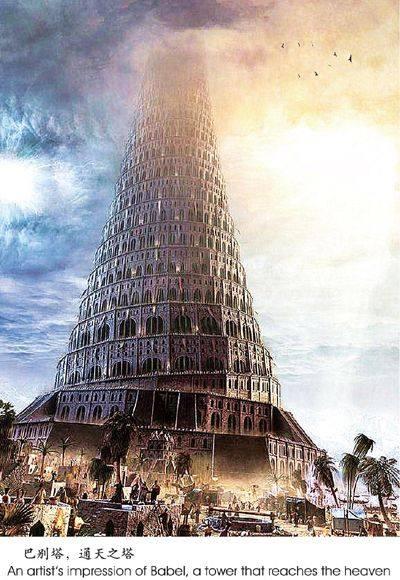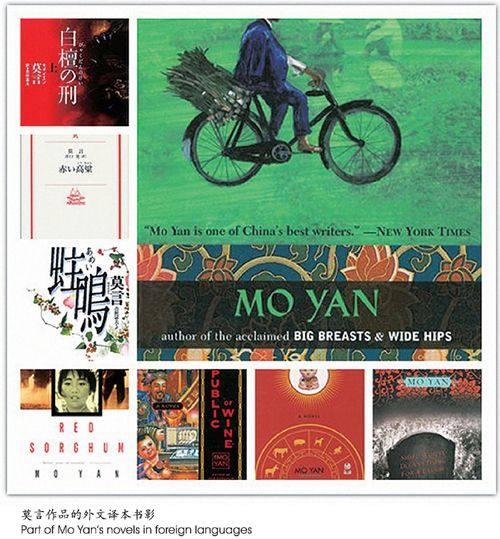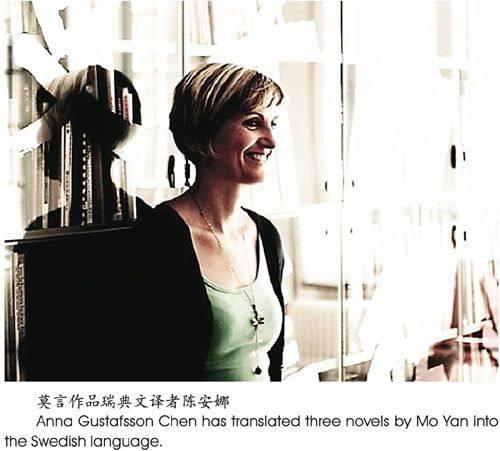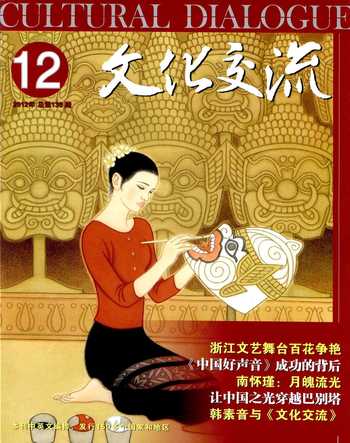让中国之光穿越巴别塔
2012-04-29沈娴
沈娴



北京时间2012年10月11日晚7点,瑞典文学院将2012年诺贝尔文学奖授予中国作家莫言。莫言因此成为首位获得诺贝尔文学奖的大陆本土作家。莫言的获奖,除了其作品文学价值本身,译者也功不可没。正是这些“中国文化的使者”,使莫言的作品冲破了语言的隔阂,为世界所认同。
莫言之“言”与大多数之
“莫言”
1988年,《红高粱》在柏林电影节上摘得了金熊奖,这让莫言笔下“超越故乡”、成为中国缩影的“高密东北乡”开始在世界范围内为人所知。莫言说:“电影是冲开了一条路,让灯光照在我们身上,能不能持续受到读者的欢迎还是看作品本身的文学价值。像我被翻译到法国的作品《丰乳肥臀》《酒国》并没有被改编成电影,但要比被改编成电影的《红高粱》反响好很多。”
但是,事实上,靠翻译推介中国文学并非易事。幸运的是,莫言遇到了许多来自世界各地的才华横溢的翻译家。被称为中国文学“接生婆”的汉学家葛浩文教授便是其中的执牛耳者。
葛浩文,美国人。他第一次接触莫言作品,是在朋友家读《红高粱家族》。当时他激动不已,连呼这才是自己想要翻译的东西。他译了八章,投给纽约的一家出版社。几天后葛浩文接到电话,里头声音急切:“这部小说我们要了。”《红高粱家族》英文译本的出版,在美国引起不错的反响。之后,莫言作品成了葛浩文翻译事业最重要的一部分,至今已译《天堂蒜薹之歌》《丰乳肥臀》《师傅越来越幽默》等。靠着葛浩文在文学界的声誉和英译本的精良,对莫言及其作品的赞誉纷至沓来。《出版者周刊》点评《丰乳肥臀》:“小说充满野性,令人回味无穷……(是)非常值得一读的小说。”而对于《师傅越来越幽默》,《纽约书评》这样评论道:“莫言把日常生活中的灾难编织成一种罕见的、有用的、令人振奋的东西。”西方文学界重量级期刊《今日世界文学》掷地有声:“莫言所表现出的虚实技巧可看做一种中国式的巴洛克,充满华丽诡异的想象。”《纽约时报》视莫言为“中国最好的作家之一”,“在国际文坛占一席之地……他的作品会赢得美国读者的青睐,就像昆德拉和马尔克斯曾受到美国读者的喜爱一样。”《泰晤士报》文学副刊则将莫言视为鲁迅“这一位深切忧思中国人命运的优秀作家”的真正的衣钵继承者。
上世纪90年代初,一个瑞典姑娘在书店看到了《红高粱家族》葛浩文的英文译本。她看了以后觉得很不错,后来买到中文原版,就试着翻译。她就是莫言作品最重要的瑞典语译者——陈安娜。她本姓古斯塔夫森,嫁给寓居瑞典的中国翻译家陈万平后取夫姓“陈”。她是诺贝尔文学奖评委及汉学家马悦然的弟子。受恩师影响,在汉学家罗德保的帮助下,陈安娜译《红高粱家族》得以出版,2001年,《天堂蒜薹之歌》出版,但莫言的书不好卖,罗德保负债累累,不得已将自己的出版社送给他人。2006年,陈安娜开始翻译《生死疲劳》,前后花了6年时间,修改了至少7次,直至2012年5月才成书,出版社不肯出版,直至陈安娜答应不要翻译费才开印。《生死疲劳》只印了1000册。莫言获奖后,此书在两天内被抢购一空。
莫言的作品迄今被译成二十几种文字,已然成为中国现当代文学的门面。但用马悦然的话来说,只需看一看《纽约客》杂志上发表了多少中国作品——迄今为止一篇都没有。中国作家们似乎在高耸通天的巴别塔前止行了,但莫言走出了登顶楼梯的脚步。星星之火,也许会有燎原之日。
翻译的叛离与文学的重生
陈安娜的经历明确传达了一个讯息:来自中国的文学作品在西方并不受欢迎。因为,翻译中文作品,对译者而言不是什么好活。那些花费心力翻译莫言作品的人,若非十分热爱,也难坚持下来;由于热爱,他们不自觉地担起了一个任务,即让世界理解中国文学。这个任务必然艰巨,因为他们要克服的是两种文化间的不对等。这种不对等是强烈的:乡土中国的情境和中国的土话是西方世界几乎完全未及的领域,是他者。而译者的任务是双向的,既要忠实于作品,又要让译作的目标读者尽可能地像原语言读者那样全面正确地理解作品。而似乎只有去形留神、打破重生,才是处理这种艰涩的跨文化交流活动最好的方式。
葛浩文的翻译着眼于背叛与重写。他说:“翻译就像读诗,每个人在读诗的时候都会把自己的经历和知识融合进去,有的是认同,有的是反对,有的是延伸。翻译的过程必然涉及变化。”他也相信大多数作家可以宽容对其作品形形色色角色的重写。有时他甚至改变作品的结构,“葛浩文的翻译特殊,不是逐字逐句翻译,甚至不是逐段翻译,而是整体重写,等于编译”,批评家顾彬说。一些学者认为他歪曲原文,但事实上,葛浩文的叛离大部分是建立在充分理解、尊重和表达原文的基础上的。比如,在《酒国》中,“信马由缰式的”被译成了“决意随波逐流,这是他的活着的方式,他听从内心的那个人”。葛浩文未译字面意思,而是根据文义,将具体情境中的含义都阐释出来了。这样所谓的“叛离”既能忠诚于原作,又能照顾读者。
陈安娜也体会到了同样的难处。她说:“你要找出作者自己的声音,他那个故事的气氛,要让瑞典读者有同样的感觉,这不容易。”陈安娜将《红高粱》译成了《红土地》,因为瑞典没有“高粱”这种作物,而“红土地”也能把作品所表达的对土地的深沉的执著表达出来。
所幸的是,莫言的声音是世界性的,就像日本人吉野福夫在翻译《丰乳肥臀》中一段农村女人赤裸上身打铁的描写时流泪了,因为他的母亲就是这样打铁的。这种移情作用,就是文学的普世意义。不论是莫言作品中童年的淤积、隐匿的传奇,还是愤懑的现实和喜剧消解的沉痛,都是隐没在遥远东方泥土气息中的人的存在的见证,最终的文化归宿都是真理和人性。莫言说:“我努力地想使我的高密东北乡故事能够打动各个国家的读者,这将是我终生奋斗的目标。”那里的疼痛和快乐是全人类疼痛和快乐的缩影,是不会在好的翻译中丢失的东西。好的译者有足够的敏感性,可以在千丝万缕中抓住作者声音的脉络。莫言的译者把握到了,他们传递的东西是人类的共性,可以被世界所接受。陈安娜对此一直很有信心:“瑞典读者读莫言的作品可能不会觉得很遥远。虽然他是写中国,但我觉得我们都是人,人的感情、人的爱和恨我们都能理解。”
世界的中国与中国的世界
毋庸讳言,莫言获得诺奖的消息传来,中国国内评论不一,但不论如何,诺奖只是一个个奖,也非民族认同或国家荣誉。马悦然认为,它并不是“一个世界冠军赛”,“因为瑞典文学院只有18个院士,一半是学者,一半是作家,其中有的是诗人,有的是写小说的。我们18个人,每年选一个作家,但是不能说这个作家就是世界上最好的作家”。我们只能希望选上的作家是一个好的作家。”由此可见,莫言的获奖正说明了世界文学界接受对扎根中国土地并反映深刻人性的中国文学的认可。其实,早在74年前,中国文学就曾受过一次诺奖的肯定:在中国生活了40余载的美国作家赛珍珠凭借中国题材的《大地三部曲》《异邦客》《东风·西风》荣获诺奖。瑞典文学院常务秘书佩尔·哈尔斯特龙曾这样评价《大地三部曲》:“她的见解保持着其深刻而温暖的人性。她完全客观地把生命注入于她的知识,并且给了我们这部使她举世闻名的农民史诗……”除此之外,据说老舍、北岛等人也曾与诺奖擦身而过。
世界对中国文学有需求,中国也需要在世界范围内发声,这说到底是一件两厢情愿的事情,其结果无疑是共赢的。这类文化交流,翻译是串联东西方文化的纽带。但当前中外文学译介格局是“信息单行道”,通过翻译引进来的很多,走出去得却不多。中国文学亟须权威、精良的译作,正如马悦然所言,“中国好的作家、好的作品太多了,但好的翻译太少了……我相信中国文学的前景很有希望。有很多中国作家已经进入了世界文学领域。需要把他们的作品翻译出来,让世界认识他们。”莫言也在问鼎后表示:“(获奖)不能代表什么,中国有许多优秀作家,他们的作品也可以被世界认可。”事实说明这并非谦词,中国现当代作家正通过一些好的翻译慢慢被国外读者认识和肯定。2004年,莫言作品法语译者尚德兰女士与莫言、李锐、余华等中国作家一同获得了“法兰西共和国艺术和文学骑士勋章”。沈从文、萧红和贾平凹等作家也因葛浩文的翻译在国外有一定的知名度。诺奖的获得,无疑会促进中国文学国外翻译的发展,推进其真正融入世界。
(本文照片由作者和达飞欴提供)
Translators Bring Mo Yans Works to World
By Shen Xian
In a sense, many believe, Nobel Laureate Mo Yan owes the honor to his Chinese-proficient translators, who are widely considered messengers of Chinese culture. These translators have helped Mo Yan break through language barriers and win global recognition.
“Red Sorghum”, a film adaptation of Mo Yans namesake novel and directed by Zhang Yimou, won Golden Bear Award at 1988 Berlin Film Festival. The film brought Mo Yan to worldwide attention, offering an insight for the first time into his fictionalized Northwest Township of Gaomi County. Mo Yan comments: “The film blazed a trail, shedding light on us. How readers will continue to pay attention to us depends on the literary value of our works. Although ‘Big Breasts & Wide Hips and ‘The Republic of Wine, A Novel have never been adapted to films, they have been translated into French and received much better responses than ‘Red Sorghum.”
Mo Yan is lucky to have had some very brilliant translators. Of these translators, Howard Goldblatt and Anna Gustafsson Chen are more familiar to the Chinese. Howard Goldblatt, US-based English translator, is one of the best translators of Mo Yans works. He ran into Mo Yans works while visiting a friend. He was thrilled to read “Red Sorghum Clan”, exclaiming that it was exactly what he wanted to translate. He translated eight chapters in a hurry and sent the manuscript to a publisher in New York. A few days later, he received a call from the publisher saying they wanted the novel and paid him a handsome amount in advance. The English version of the novel received good critical acclaim after it was published. Since then, Mo Yan has been Goldblatts translation project. He has translated quite a few novels of Mo Yan into English and they are critically acclaimed.
It was in the early 1990s that Anna Gustafsson Chen spotted the English version of “Red Sorghum” in a bookstore in Stockholm. It was translated by Howard Goldblatt. She read it and liked it. She then purchased a Chinese version and began to translate it into Swedish. Married to Chen Wanping, a Chinese author living in Sweden, Anna Gustafsson Chen used to study under the guidance of Nils G?ran David Malmqvist, member of Swedish Academy that decides the winners of the Nobel Prize in Literature. With the help of a sinologist in Sweden, Anna Chen translated “Red Sorghum Clan” into Swedish and published the five-volume novel. In 2001, she published her Swedish version of “The Garlic Ballads”. In 2006, she began to translate “Life and Death Are Wearing Me Out”. It was in May 2012, after six years and seven versions, that she completed the translation. The publisher did not print it until she said she waived her translation fee. The first print was 1,000 copies. After Mo Yan was awarded the Nobel Prize in Literature, the remaining copies sold out within two days.
Mo Yans works have been translated into more than 20 languages, opening a global window on the modern Chinese literature. However, Chinese writers have a long way to go before they can be better recognized and appreciated by the world. One hallmark of the worlds ignorance to their works is, as G?ran Malmqvist put it, that New Yorker, a world-famous literary weekly based in New York, has never published any literary works by a modern Chinese writer. Chinese authors seem to be going nowhere in front of the Babel, a symbol of language barriers. However, as Mo Yan has paved the way, modern Chinese writers will have a better chance to be read internationally.
Anna Gustafsson Chens translation of Mo Yans three novels seems to convey a clear-cut message: modern Chinese literature is not what western readers want. Moreover, translating Mo Yan into western languages has never been an easy task. The translators have faced the stark difference between the Chinese culture and western cultures. The rural China and its dialects are most unfamiliar to the western readers of today. The world in Mo Yans works is almost otherworldly. The translators need to be faithful to the original works while they need to create translations that target readers will read as if the books were written in the languages familiar and accessible to them.
Howard Goldblatt focuses on rewriting. He does not translate verbatim. He observes: “Translation can be compared to poetry reading. Everyone reads his own experience and knowledge into a poem. He may identify, he may object, and he may extend. Translation is a process of changes.” He believes that most authors tolerate the rewriting of characters of their works. He sometimes even restructures a text. A German sinologist and critic says that Goldblatt translates in a special way: he does not translate word by word; sometimes he goes so far as even not to translate paragraph by paragraph; he rewrites the whole thing; what he does is translating and editing. Some scholars think he distorts the source text. But Goldblatt believes his so called betrayal and rewriting is based on full understanding, respect and expressing the meaning of the source text.
Anna Chen has run into similar difficulties. “You need to find the authors voice and the atmosphere of the story. It is not easy to enable the Swedish readers to feel the same.” She translated the book name “Red Sorghum” into “Red Land” in Swedish, as there is no red sorghum in Sweden and readers may not know what it is at the first sight of the word.
